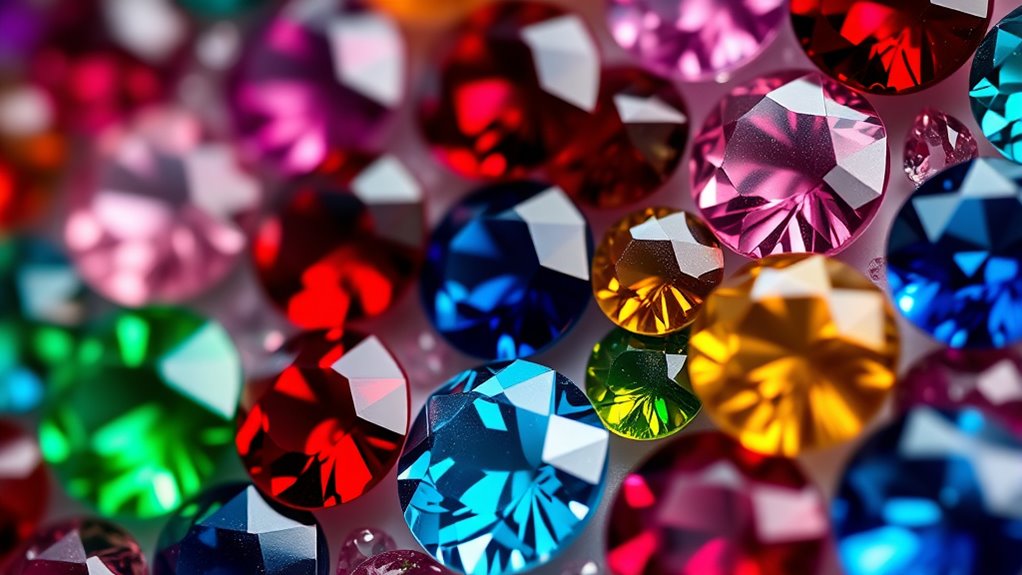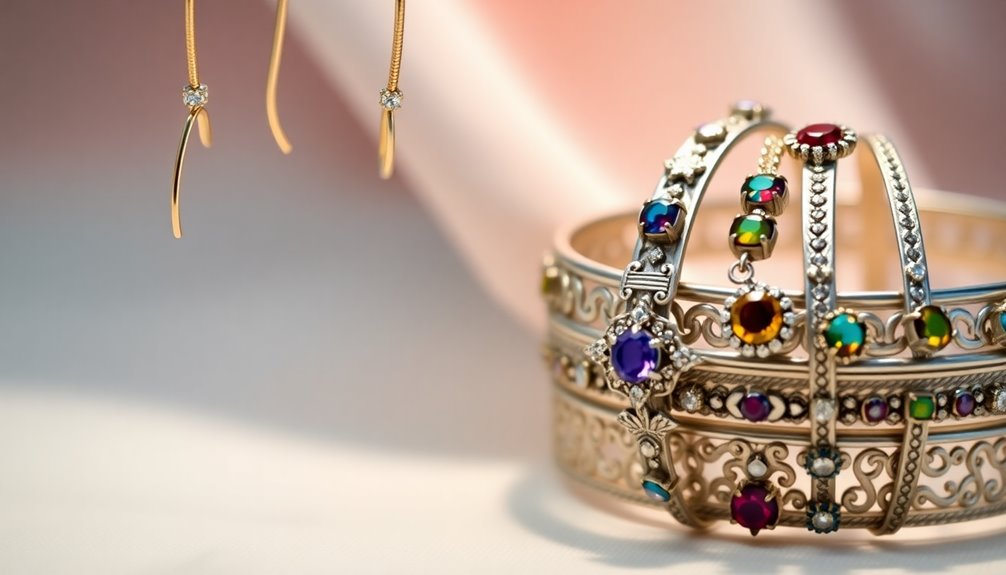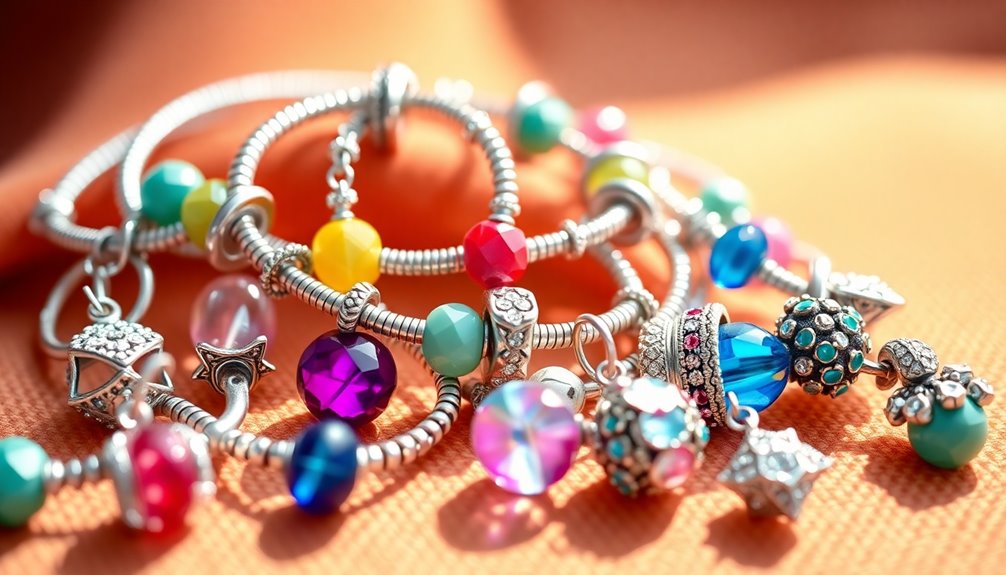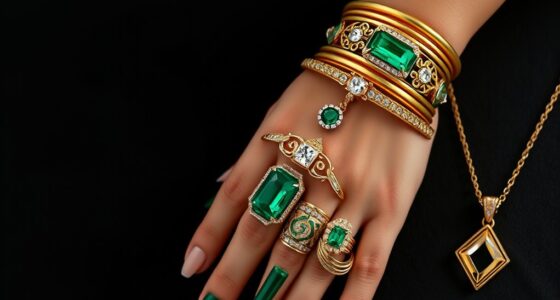Birthstones have a long history rooted in ancient cultures like the Jews and Egyptians, linking each stone to months, tribes, and spiritual beliefs. Today, they symbolize personal identity, protection, and luck, with meanings often passed down through generations. Their significance is enhanced by gemstone quality and authenticity, connecting you to centuries of tradition. Exploring this fascinating history and symbolism can deepen your understanding of what your birthstone truly represents—keep going to uncover even more.
Key Takeaways
- Birthstones originate from ancient cultures, symbolizing protection, health, and spiritual significance linked to the twelve tribes of Israel.
- Historically believed to possess mystical powers, birthstones were used as talismans for luck and personal protection.
- Modern interpretations associate specific gemstones with personal qualities, heritage, and meaningful gifts beyond their historical origins.
- Gemstone quality and authenticity influence their value and symbolic significance, emphasizing the importance of verified origins.
- Birthstones serve as cultural and personal symbols, connecting individuals to history, tradition, and their own identity.

Have you ever wondered why certain gemstones are associated with specific months? The tradition of birthstones has deep roots that stretch back centuries, blending history and culture into a fascinating tapestry. The historical origins of birthstones trace back to ancient civilizations like the Jews, who linked gemstones to the twelve tribes of Israel, each tribe represented by a different stone. Later, in the 1st century AD, the Breastplate of Aaron, described in the Bible, featured twelve stones symbolizing the twelve tribes, setting a foundation for later associations between gemstones and months. Over time, these stones became symbols of protection, health, and good fortune, with their meanings evolving through different cultures and eras.
Cultural significance plays a huge role in how we view birthstones today. In many societies, gemstones weren’t just decorative; they were believed to hold mystical powers and spiritual significance. For example, ancient Egyptians associated certain stones with divine protection and healing, while the Greeks and Romans thought each gemstone had specific qualities, influencing everything from health to luck. In the Middle Ages, birthstones gained popularity as personal talismans, and their meanings often reflected societal values and beliefs. As different cultures traded and interacted, the list of birthstones expanded and shifted, creating a rich tradition that blends superstition, spirituality, and personal identity.
Today, the cultural significance of birthstones continues, but it’s also become more personal and modern. Many people see their birthstone as a symbol of identity, or as a meaningful gift that connects to family traditions. The meanings attached to each stone—like garnet symbolizing protection or emerald representing renewal—are often passed down or personalized, giving these gems a contemporary significance beyond their historical roots. Additionally, the quality and authenticity of gemstones play a crucial role in their value and symbolism, making gemstone grading an important aspect for collectors and enthusiasts alike. Although the original symbolism may have faded with time, the connection to individual identity remains strong. You might choose a birthstone for its beauty, its supposed powers, or as a way to honor your heritage or loved ones.
In essence, the historical origins and cultural significance of birthstones create a bridge between ancient beliefs and modern symbolism. The stones carry stories of civilizations past, spiritual meanings, and personal connections, making each one more than just a pretty gem. They serve as tangible links to history and culture, reminding you that what you wear or cherish can hold centuries of tradition and meaning. Whether for protection, luck, or self-expression, your birthstone is a small but powerful piece of history that continues to shine in today’s world.
Frequently Asked Questions
How Are Birthstones Selected for Each Month Historically?
You learn that historically, birthstones were selected based on historical selection methods that combined religious, cultural, and mystical influences. Different cultures, like the Hebrews and Greeks, assigned stones to months based on their symbolic meanings or legends. Over time, these cultural influences shaped the modern list, blending ancient beliefs with tradition. This process guaranteed each month’s birthstone reflected its unique history and cultural significance, making them meaningful and personal.
Do Birthstones Have Any Scientifically Proven Health Benefits?
You might think birthstones have miraculous health benefits, but scientific research shows they don’t. There are no proven health claims linking these gemstones to physical or mental well-being. While they can boost your mood or serve as meaningful symbols, don’t rely on them for medical cures. Instead, focus on proven health practices—good diet, exercise, and medical advice—because the sparkling stones are more about tradition than science.
How Have Birthstone Meanings Evolved Over Different Cultures?
You’ll find that birthstone meanings have evolved considerably across cultures, reflecting their unique cultural symbolism and historical significance. For example, ancient Egyptians associated emeralds with fertility, while Europeans linked sapphires to divine favor. Over time, different societies have ascribed new meanings, blending tradition with modern beliefs. This evolution shows how birthstones serve as a bridge between history and cultural identity, adapting their significance to fit diverse cultural narratives.
Can Birthstones Influence Personality Traits or Destiny?
Sure, your birthstone might be influencing your personality traits or even shaping your destiny—at least, that’s what some believe. You wear that gem, and suddenly, confidence or luck seems to follow. While science might scoff, many think these stones hold subtle powers of personality influence and destiny shaping. So, maybe your birthstone isn’t just a pretty ornament but a tiny, sparkly force guiding your life’s path.
Are There Alternative or Modern Birthstones for Each Month?
Yes, there are alternative gemstones and modern birthstone options for each month. You might choose different stones based on personal preferences or new trends. For example, instead of traditional garnet for January, some opt for snowflake obsidian. These alternative gemstones can add unique meaning and style to your jewelry. Exploring modern birthstone options allows you to personalize your connection to your birth month while embracing evolving trends.
Conclusion
Now that you’ve uncovered the rich lore and modern meanings behind birthstones, you might wonder which stone truly resonates with you. Could it be the one that holds ancient secrets or the one that symbolizes your future? Remember, each gemstone carries its own unique power—waiting to reveal its magic. So, will you choose the stone that calls to your soul or let it remain a mystery? The choice is yours—what will your birthstone reveal?










